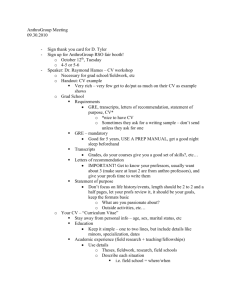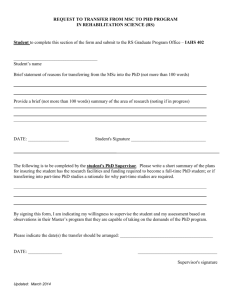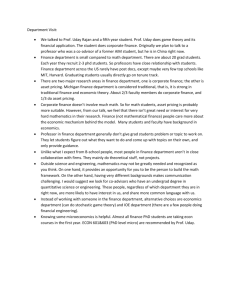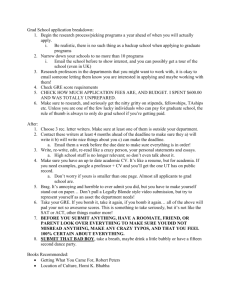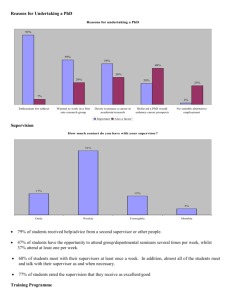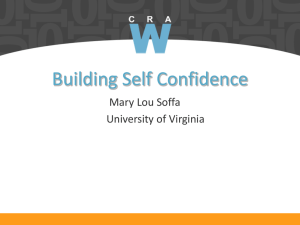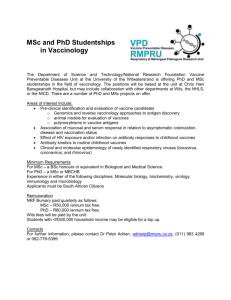September 2006 Orientation September 8 11:00
advertisement
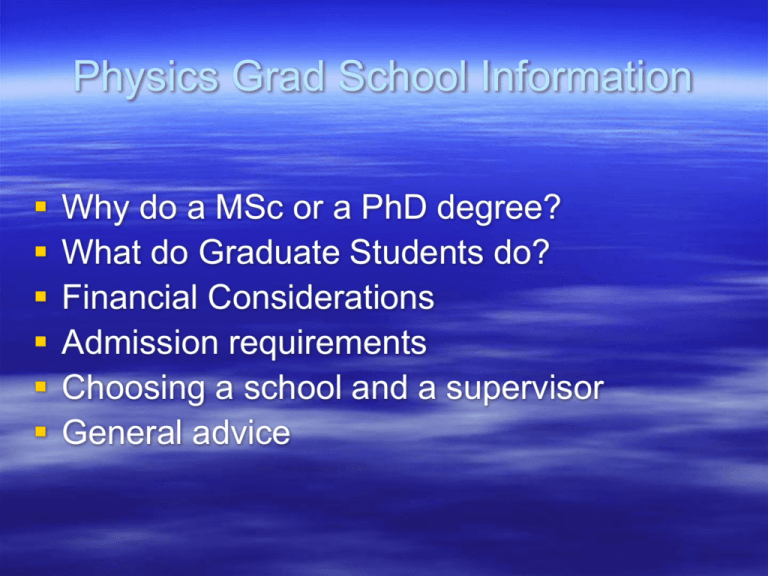
Physics Grad School Information Why do a MSc or a PhD degree? What do Graduate Students do? Financial Considerations Admission requirements Choosing a school and a supervisor General advice Why do a Graduate Degree? Good Reasons Interest in the field of research! Extra qualifications needed for a professional program (eg. Geophysics, medical physics, teaching) Bad Reasons Don’t know what else to do. Fame & Fortune How long does it take? A MSc degree takes about 2 years A PhD takes another 4-5 years In Canada it is usual to enter as a MSc student. (USA usually enter into PhD) After one year you can transfer into the PhD program if you’re doing well. In the transfer option it should take a total of about 5 years. After doing a MSc degree you can change schools and/or research area and do a PhD. What do Grad Students Do? Take courses: (U of A) 4 courses for MSc and another 4 for a PhD Teach: Grad students usually are hired to be a lab TA (or grade homework or run tutorials) for 12 hours/week during the academic year Research: Make new discoveries and write up results in a thesis The main focus of a graduate degree is the thesis which describes your new results. Your results will probably also be published in refereed scientific journals as one or more papers. Financial Considerations Numbers for the U of A (other schools similar) Basic support: – From Sept - April students are paid $8,200 per semester to TA – From May - Aug students are paid $8,200 by their supervisor to be a research assistant – Total support (before taxes & tuition) $24,600 per year – Salary increases by about $600 per year + Cost of Living – All students accepted at the U of A are guaranteed basic support (up to time limits) Students with scholarships will make more. You usually have to apply early (in January) in order to be considered for a scholarship. You have to pay your tuition and living expenses out of this salary. Admission Requirements Most schools are only interested in your grades from the last two years of study Most schools will want to see courses similar to what we require in the honors or specialization programs U of A minimum GPA: 3.2 Some schools will have a min GPA of 3.0 GPA above 3.7 will make scholarships more likely Research experience will increase your chances of a good offer Admission Procedures When you apply you must submit: – Transcripts – Letters of recommendation (from 2 or 3 profs) – A one-page essay about why you want to do a graduate degree. Discuss your research interests here. This is sometimes used as an unofficial scholarship application, so make sure it sounds good. – Web form – A resume (or C.V.) with a concise summary of your relevant experience is a good idea – Application Fee ($50-$100) (Be careful about where you apply -- it can get expensive!) For schools in the USA you usually must write the GRE general and physics exams as well. GRE Exams American Universities will require the GRE general and/or physics exam. Information about registration: www.ets.org General exam is written at Sylvan Learning Centre (in the west end of Edmonton) Subject tests (such as physics) are written once a month, often at the UofA. Contact ETS to register and find the location. The physics test needs to be taken by October if you want meet the typical deadlines. Choosing a School Take a look at web pages for different universities Department of Physics for most fields, but also look at: Earth Sciences (for geophysics), Astronomy (U of T and USA), Oncology (medical physics), engineering (applied physics) How many profs are doing research in your field of interest? Is the school well-known for research in your field? Are there many courses available in your field? Typical Programs Condensed Matter, Lasers, Nanotech Geophysics Astrophysics Medical Physics Particle Physics Canadian Universities Big Schools (more than 120 grad students): McGill, Toronto, Alberta, British Columbia (+Laval & Montreal if bilingual) – Offer programs in most major research areas – Top researchers and facilities – Supervisors might have 10 or more students Medium Schools (40 - 90 grad students): Dalhousie, Ottawa, McMaster, Queen’s, Guelph, Waterloo, Western Ontario, Calgary, Simon Fraser, Victoria – Will have great programs in many specialties – Some excellent researchers Smaller Schools: Memorial, New Brunswick, St. Mary’s, Brock, Carleton, Manitoba, Saskatchewan, Lethbridge – Some very good programs – Not all areas of physics covered – Could be a good place to do a MSc degree American Universities Top Private Schools: Caltech, MIT, Harvard, Yale, Stanford, Cornell, Princeton Top State Schools: U California (Berkeley, Santa Barbara, LA, San Diego, Davis), U Michigan, U Arizona, U Illinois, U Hawaii, U Wisconsin If you are accepted into a US school, you will probably get a tuition waiver and a TA If you are going to the USA, go to the best! Choosing a Supervisor Your supervisor is more important than the university Your supervisor will guide your research and train you Considerations: – Excellence: Does the prof publish lots of good papers in good journals? (ask profs here) – Personality: Are you going to get along? – Does the prof already have lots of students? A few students are good since you will also work with them. Too many students can be bad since you may never see your prof. – Does the prof meet regularly with students? – Does the prof pay for students to go to conferences? Email potential supervisors and ask if they will be taking on new students. Tell them a little bit about yourself and tell them why you are interested in their research. (Not all profs will respond!) If possible, visit the University and talk to profs and other grad students in person before making a decision. Advice for 3rd year students The best way to find out if you might like to do research is to try it out! The NSERC summer USRA program helps professors hire students to do research over the summer. NSERC USRA scholarships can be held at any Canadian university, but you have to apply to each one separately. Deadline is early January, give application to Janet Couch. Even without a NSERC scholarship, many professors will hire a student to do research in the summer. Just Ask. In 4th year Phys 499 is a research project course. You can continue the summer research or start a new project. General Advice Apply in January to be considered for scholarships Most Canadian schools will accept students later (as late as March or April) Ask profs here their opinion of other schools and other potential supervisors Ask me (Sharon Morsink morsink@ualberta.ca) for specific advice about particular programs or schools.
